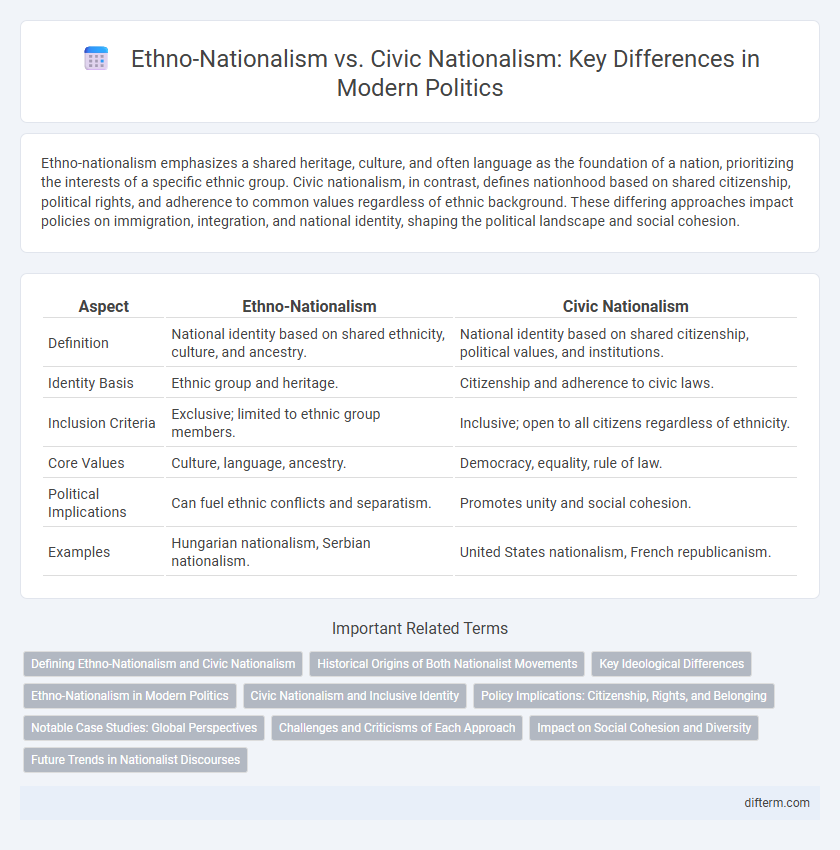Ethno-nationalism emphasizes a shared heritage, culture, and often language as the foundation of a nation, prioritizing the interests of a specific ethnic group. Civic nationalism, in contrast, defines nationhood based on shared citizenship, political rights, and adherence to common values regardless of ethnic background. These differing approaches impact policies on immigration, integration, and national identity, shaping the political landscape and social cohesion.
Table of Comparison
| Aspect | Ethno-Nationalism | Civic Nationalism |
|---|---|---|
| Definition | National identity based on shared ethnicity, culture, and ancestry. | National identity based on shared citizenship, political values, and institutions. |
| Identity Basis | Ethnic group and heritage. | Citizenship and adherence to civic laws. |
| Inclusion Criteria | Exclusive; limited to ethnic group members. | Inclusive; open to all citizens regardless of ethnicity. |
| Core Values | Culture, language, ancestry. | Democracy, equality, rule of law. |
| Political Implications | Can fuel ethnic conflicts and separatism. | Promotes unity and social cohesion. |
| Examples | Hungarian nationalism, Serbian nationalism. | United States nationalism, French republicanism. |
Defining Ethno-Nationalism and Civic Nationalism
Ethno-nationalism defines a nation primarily through shared ancestry, culture, language, and ethnic heritage, emphasizing exclusivity based on those common traits. Civic nationalism, in contrast, bases national identity on shared citizenship, political rights, and allegiance to common institutions, promoting inclusivity regardless of ethnic or cultural background. These distinct frameworks shape policies on immigration, minority rights, and national unity, influencing political discourse and nation-state governance worldwide.
Historical Origins of Both Nationalist Movements
Ethno-nationalism emerged in 19th-century Europe as a reaction to imperial rule, emphasizing shared ancestry, language, and culture to define nationhood, evident in movements like Pan-Germanism and Pan-Slavism. Civic nationalism arose during the same period as a response to ethnic conflicts, promoting inclusive citizenship based on shared political values and rights, exemplified by the French Revolution's emphasis on popular sovereignty. These historical origins reflect contrasting foundations of national identity: genetic-cultural homogeneity versus legal-political community.
Key Ideological Differences
Ethno-nationalism emphasizes a shared heritage, culture, and ancestry as the basis for national identity, often prioritizing the interests of a specific ethnic group. Civic nationalism centers on a shared political commitment and allegiance to common laws and values, promoting inclusivity and citizenship regardless of ethnic background. Key ideological differences include ethno-nationalism's focus on ethnic homogeneity versus civic nationalism's emphasis on pluralism and legal equality.
Ethno-Nationalism in Modern Politics
Ethno-nationalism in modern politics emphasizes the primacy of a shared ethnicity, culture, and heritage as the foundation for national identity, often advocating for policies that prioritize the dominant ethnic group within the state. This form of nationalism frequently challenges multiculturalism and immigration, fueling debates about citizenship, integration, and minority rights. Its resurgence is linked to rising populist movements and socio-political anxieties over globalization, demographic changes, and national sovereignty.
Civic Nationalism and Inclusive Identity
Civic nationalism emphasizes shared values, legal equality, and political participation to create an inclusive national identity that transcends ethnic, religious, or cultural differences. It promotes citizenship based on common political principles and a commitment to democratic institutions rather than ancestry or ethnicity. This approach fosters social cohesion and pluralism, countering exclusionary ethno-nationalist narratives that often marginalize minorities.
Policy Implications: Citizenship, Rights, and Belonging
Ethno-nationalism prioritizes citizenship policies that favor a dominant ethnic group, often restricting rights and societal belonging to those who share common ancestry or cultural heritage. Civic nationalism promotes inclusive citizenship based on shared values and political participation, ensuring equal rights regardless of ethnicity or background. Policies rooted in civic nationalism enhance social cohesion by fostering belonging through legal equality and universal rights rather than ethnic identity.
Notable Case Studies: Global Perspectives
Ethno-nationalism emphasizes shared heritage, language, and ethnicity as the basis for national identity, illustrated by the rise of Catalan independence movements in Spain and the quest for Kurdish autonomy in the Middle East. Civic nationalism, in contrast, centers on shared values, legal frameworks, and citizenship, exemplified by the United States' emphasis on constitutional rights and South Africa's post-apartheid nation-building efforts. These global case studies demonstrate how different nationalist models shape political stability, social cohesion, and policy implementation across diverse multicultural societies.
Challenges and Criticisms of Each Approach
Ethno-nationalism faces criticism for promoting exclusionary identity politics that often marginalize minority groups and fuel ethnic conflicts, undermining social cohesion. Civic nationalism is challenged by accusations of superficial unity, as its emphasis on shared values and political participation sometimes struggles to address deep-seated cultural differences and identity claims. Both approaches grapple with balancing national solidarity and diversity, complicating efforts to create inclusive yet cohesive political communities.
Impact on Social Cohesion and Diversity
Ethno-nationalism often emphasizes shared ancestry and cultural heritage, which can lead to exclusionary policies and social fragmentation, undermining social cohesion. Civic nationalism promotes inclusive citizenship based on common values and political participation, fostering unity and celebrating diversity within pluralistic societies. The impact on social cohesion hinges on whether the nationalism model incorporates or marginalizes diverse identities and cultural backgrounds.
Future Trends in Nationalist Discourses
Future trends in nationalist discourses indicate a growing tension between ethno-nationalism, which prioritizes shared ethnicity and cultural heritage, and civic nationalism, emphasizing inclusive citizenship and democratic values. Emerging geopolitical conflicts and migration patterns are likely to intensify debates around identity, sovereignty, and belonging. Digital media platforms and transnational networks will play a critical role in shaping and spreading these nationalist narratives globally.
ethno-nationalism vs civic nationalism Infographic

 difterm.com
difterm.com